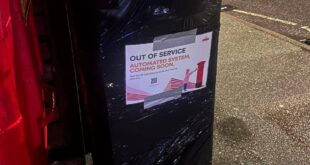Smart AI fashion boutiques will use scanners to create individual ‘made-to-measure’ clothes, reducing the need for retailers to house expensive stock as well as ensuring the perfect fit. Haptics – wearable tech allowing you to feel heat and touch – were cited as the future of gaming and education industries. These are the predictions of four of Britain’s leading futurists and consumer business experts behind the NatWest Future Businesses Report, which offers a vision of how British industry could look by the year 2036.
The report was commissioned by the bank to inspire the next generation of start-ups and SMEs and authored by leading futurist Dr Ian Pearson, consumer business guru Kate Hardcastle, Shivvy Jervis, founder of FutureScape248 – the award-winning human-centred innovation lab – and futurist and author Tom Cheesewright. The panel revealed that in the near future, travel agents could let holidaymakers “try-before-you-fly” through virtual reality experiences and the daily commute could take place in high-speed personal travel pods to beat city congestion.
Protein-rich insects served by ‘bug burger bars’ are predicted to become the fast foods of choice with fried locust or a worm burger replacing the late-night kebab. While AI fashion boutiques could use technology to design perfectly made-to-measure clothes.
Futurist Dr Ian Pearson, one of the authors of the NatWest Future Businesses Report, said: “The NatWest Future Business Report helps to paint a picture of what changes we may see in the business environment over the next 15 years. What was clear to all of us was how a greater interaction with technology is going to revolutionise businesses and transform almost all industries.
“One thing the panel all agreed on is this is not the end of our high streets, which will thrive if businesses can offer good enough reasons to go there. Long term, more than 50 per cent of retail will still be in high street shops with predictions like AI tailoring and insect food outlets showing how businesses could adapt in future.”
The report stated robot farmers or drones, like those seen in 2014 film Interstellar, will help to meet humanity’s soaring food demands – estimated to spike by up to 98 percent by 2050. Human health monitoring will get a boost from smart toilets with the power to analyse urine and faeces for killer diseases such as diabetes and cancer.
Despite fears of robots robbing humans of jobs, only four percent of respondents thought their work would become completely obsolete by 2036. Almost two thirds (64 percent) admitted their skill sets would need to adapt in the next 15 years to keep up with technology – and 52 percent claimed they wanted to work with robots by 2036.
Andrew Harrison, managing director for business banking at NatWest, added: “As this landscape evolves, NatWest continues to be the biggest supporter of UK small business at all stages of development.
“From our Dream Bigger programme in schools encouraging young people to explore entrepreneurial mindset; our fully funded Business Builder initiative for early-stage entrepreneurs; and our Entrepreneur Accelerator hubs for high growth, green and diverse businesses, our vision is to help more companies start, scale and succeed.”
The NatWest Future Businesses Report is available here. To see how NatWest is backing businesses across the UK you can also Watch Alison Hammond spend a day as an intern with a selection of businesses from across the UK as part of NatWest’s Backing Businesses partnership with ITV.



